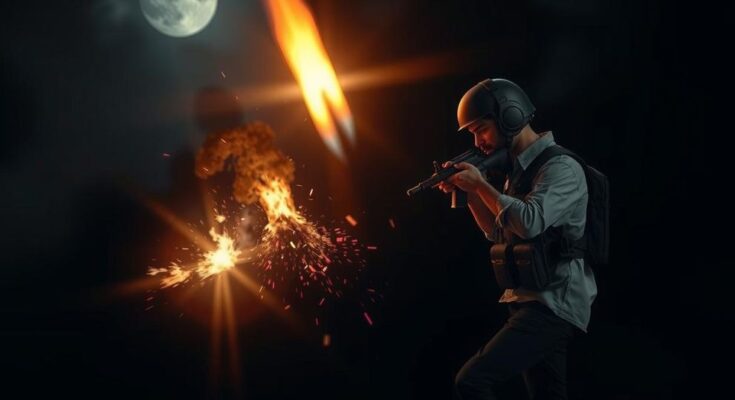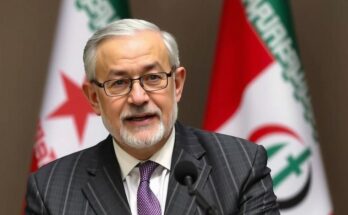Iran’s Revolutionary Guards chief warned Israel against retaliatory strikes following a missile attack as Israel escalates military operations against Hezbollah in Lebanon. Concerns of a broader Middle Eastern conflict rise with continued fighting, U.S. diplomatic efforts, and a deteriorating humanitarian situation on both sides of the conflict.
On Thursday, the commander of Iran’s Revolutionary Guards issued a stern caution to Israel against launching retaliatory attacks following a missile barrage. This warning comes in the context of Israel intensifying its military operations in Lebanon against Hezbollah, which is supported by Tehran. Concerns of a broader regional conflict are escalating as Israel formulates its response to the missile assault executed by Iran on October 1, which followed Israeli airstrikes against Iranian-aligned insurgents. Hossein Salami proclaimed during a televised address, “We tell you (Israel) that if you commit any aggression against any point we will painfully attack the same point of yours,” asserting Iran’s capability to breach Israel’s defensive measures. In a related dialogue, U.S. Defense Secretary Lloyd Austin conferred with Israeli Defense Minister Yoav Gallant regarding Israel’s continued operations in Lebanon and Gaza, aimed at defusing the potential for a wider regional confrontation. Simultaneously, Iran’s Foreign Minister, Abbas Araqchi, is conducting a tour of the Middle East, meeting with leaders such as Egyptian President Abdel Fattah al-Sisi, who reiterated Egypt’s stance for restraint and avoidance of escalation in the region. Despite this, Israel shows no inclination to attenuate its military engagement with Hezbollah and Hamas, intent on imposing consequences on Iran for the October missile attack. Israeli airstrikes have resulted in casualties, including the reported deaths of 11 Palestinians in Gaza on Thursday, as Israel continues its ground offensive aimed at dismantling Hezbollah’s capabilities. The Israeli military claims to have eliminated 45 Hezbollah fighters in recent operations, further asserting control over the southern Lebanon region. Moreover, evacuation alerts have been issued for specific areas in Lebanon in response to ongoing military activities aimed at Hezbollah. Notably, one airstrike obliterated the municipal headquarters in a southern town, causing significant casualties and destruction. As the conflict persists, the humanitarian situation remains dire, with significant displacement and loss of life on both sides.
The ongoing conflict between Israel and Hezbollah, alongside Iranian involvement, has exacerbated tensions in the Middle East. Following a missile attack by Iran on October 1, in response to Israeli airstrikes, the threat of widening hostilities has become more acute. Iran’s posture reflects a long-standing animosity towards Israel, and as both nations engage in military actions, the risks of a comprehensive regional war loom larger. U.S. diplomatic efforts aim to mitigate these tensions, yet military confrontations continue to escalate, particularly in Lebanon and Gaza. Observers note a significant humanitarian toll, with civilian populations bearing the brunt of the violence amid escalating military operations.
In conclusion, the situation remains highly volatile, with Iran firmly warning Israel against further aggression. Israel’s unwavering military efforts against Hezbollah and Hamas signify an ongoing cycle of violence that raises concerns about a regional conflict. Diplomatic interventions by the U.S. and other nations reflect ongoing attempts to de-escalate tensions, yet the reality on the ground indicates a precarious state with significant human costs. As regional dynamics evolve, the need for strategic dialogue and measures to protect civilian populations becomes increasingly critical.
Original Source: www.jpost.com




